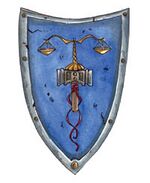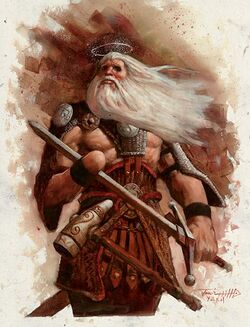Tyr
| Tyr | ||
|---|---|---|
 Balanced scales resting on a warhammer |
||
| Aliases | Anachtyr, the Blind Lord, the Blind Overlord, Blind Tyr, the Even-Handed, God of Justice, Grimjaws, the Just God, the Maimed God, the One-Handed, the Wounded One, Wounded Tyr | |
| Alignment | Lawful Good | |
| Divine Rank | Greater God / Dead God | |
| Pantheon | Faerûn, Norse | |
| Portfolio | Justice | |
| Domains | 3E: Good, Knowledge, Law, Retribution, War 5E: Order, War |
|
| Home Plane | Great Wheel: The Court (Celestia) and Ysgard (as Asgard) World Tree: The Court (House of the Triad) |
|
| Worshippers | Paladins, Judges, Magistrates, Lawyers, Police. | |
| Favoured Weapon | Justicar (Longsword) | |

Tyr, also known as the Maimed God (but nothing to do with the other Maimed God) is/was the deity of justice and law in the Forgotten Realms setting, as well as being a member of the 3E Asgardian Pantheon in exactly the same capacity.
Is also virtually identical to the real world Norse/Germanic god Tyr (or Tiwaz)
History[edit | edit source]
Asgardian[edit | edit source]
Tyr is the son of Odin and Frigga and is considered the third most senior deity after Odin and Thor and was the patron of trust, courage and sure-tactics and can predict the course of any battle. He lost his hand when the gods attempted to bind Fenrir and was fated to die at Ragnarok.
This being mythology, it's complicated as shit, of course. According to other versions of the myth, Tyr is actually a jotun, not an Aesir, and he's the child of Hyme.
As a child of the leading gods of Norse Mythology and as a god of strategy, war and loyalty, he can be considered roughly equivalent to Athena of Greek Mythology.
Forgotten Realms[edit | edit source]
Tyr came to Toril as an interloper deity during a period known as the Procession of Justice, where he burst into the realms without warning at the head of an army of 200 Archons and attempted to pacify the region of Jhaamdath which had fallen to lawlessness. This campaign brought Ilmater on board, who had previously been somewhat of an unknown deity and catapulted him into popularity; and later Torm would join as Tyr's warleader. Tyr had only planned to stick around in the Realms long enough to finish his campaign of bringing law and order and intended to return home afterwards, but by the time he was finished most of his army was dead and his cult had started to spread across the continent; so the Triad was born.
The reason he is referred to as the Maimed God is because he has lost his hand and has been struck blind. Similarly to the Asgardian telling, he lost his hand to a hound, in this case Khezef the Chaos Hound and follows roughly the same story where Gond created an unbreakable leash and bet the hound that he could not break out of it. Khezef agreed to the bet on condition that Tyr (the least duplicitous of the gods) placed his hand in the beast's mouth; Gond then anchored the chain to Pandemonium and Mystra laid a magical veil over the beast that automatically repaired itself; when Khezef finally understood what the gods were doing to him he bit Tyr's hand off in anger. He was later struck blind during the Time of Troubles after talking back to Ao about the injustice of punishing all of the gods for the actions of an unknown perpetrator.
Tyr started going off the rails not long after that and killed Helm when he started getting suspicious that the god of vigilance was attempting to steal the heart of Tymora, who Tyr was attempting to woo. Quite possibly because of this, he lost his faith in his ability to lead properly and abdicated his godhood to Torm, allowed much of his portfolio to be absorbed by Bahamut and then quietly retired back to the Upper Planes where he was later killed in a demonic invasion (probably returning home to die at Ragnarok). Then he came back for the Fifth Edition retcons, taking most of his power and portfolio back from Bahamut.
Worshippers[edit | edit source]
Tyr fits the image of a traditional god of law and goodness, so his faith particularly appeals to those with a sense for fairness and ordered civilisation.
They largely subscribe to the "eye for an eye" philosophy which gives them a reputation for being harsh arbiters of the law, but they frequently err on the side of mercy: particularly when crimes have been committed through ignorance or by mistake. Though individual churches keep an ongoing Book of Lawgiving that they share with nearby temples to ensure up-to-date criminal records are held, and to make certain that repeat criminals are identified and dealt with appropriately.
He has a lot of Paladins and Clerics who fight against tyranny in lawless lands and will often act as Judge, Jury and Executioner in many cases. They will never enforce laws which can be shown to be unjust, though the measure of "unjust" can be broad and can often force them to abide by laws which are merely "unfair". Though to their credit followers of Tyr will attempt to change such laws by working within the system.
Specific orders of Tyrran Paladins include the Knights of Holy Judgment who focus primarily eliminating perversions of law, such as exterminating devils and punishing criminals. While the Knights of the Merciful Sword spend their time upholding Tyr's view of goodness and seek out and slay monsters (particularly demons) while protecting the common man.
Triadic Knights[edit | edit source]
Are an order of Knights (most often Paladins, but not necessarily) who revere the Triad as a whole, and believe that to truly embody the virtues of Paladin-hood they must draw on the strengths of all three gods. Represented uniquely as a seven-level Prestige Class that gains abilities relevant to each individual faith; including the Hands of Ilmater meaning they can no longer be sickened; the Eyes of Tyr where they can no longer be blinded or dazzled; and the Heart of Torm becoming immune to fear. As well as continuing to gain/improve the Paladin mount, spellcasting, and Smite Evil abilities.
Realm[edit | edit source]
Tyr resides in The Court where no lie can be spoken and attempts at deception automatically fail. The exact position of the Court varies between editions, though both are relative to the mountain of Celestia. In the Great Wheel it exists in Lunia, the first layer of the great mountain, while in the World Tree model it exists as a separate mountain in view of Celestia itself. Siamorphe has her realm close by, but they are not considered allied powers.
Petitioners to his realm arrive as Lantern Archons, but have no planar commitment and can leave and return at will. Though the House of the Triad as an entire plane has different rules on petitioners depending on the deity, so those visitor from Helm's realm for instance retain their mortal forms.
Trivia[edit | edit source]
Like several other D&D deities, Tyr is borrowed from real-world mythology; specifically Norse. Though in Tyr's case his origins are practically unchanged from the source material, unlike Oghma or Silvanus who have been significantly altered in some way after the transition.
The primary difference is that Norse Tyr might have actually been the head of his pantheon (even over Odin) at some point; note that the Norse word tyr translates simply as "god" (this element sometimes appears in the various bynames of other deities, for example, Gautatyr, which is one of Odin's names). Similarly his mythological father may have been Odin, or alternatively it could have been the giant Hymir. Norse history can be somewhat hazy like this.
| The Deities of Forgotten Realms | |||
|---|---|---|---|
| Lawful | Neutral | Chaotic | |
| Good | Ilmater • Nobanion • Torm • Tyr | Chauntea • Deneir • Eldath • Enlil • Gwaeron Windstrom • Lathander • Mielikki • Milil • Mystra • Shiallia | Lliira • Lurue • Selûne • Sharess • Sune • Tymora • Valkur |
| Neutral | Azuth • Helm • Hoar • Jergal • Kelemvor • Red Knight • Savras • Siamorphe • Ulutiu | Akadi • Ao • Auppenser • Gond • Grumbar • Istishia • Karsus • Kossuth • Oghma • Silvanus • Tempus • Ubtao • Waukeen | Finder Wyvernspur • Ibrandul • Leira • Mask • Shaundakul • Uthgar |
| Evil | Asmodeus • Bane • Gargauth • Gilgeam • Iyachtu Xvim • Loviatar | Auril • Bhaal • Myrkul • Shar • Velsharoon | Beshaba • Cyric • Garagos • Malar • Moander • Talona • Talos • Umberlee |